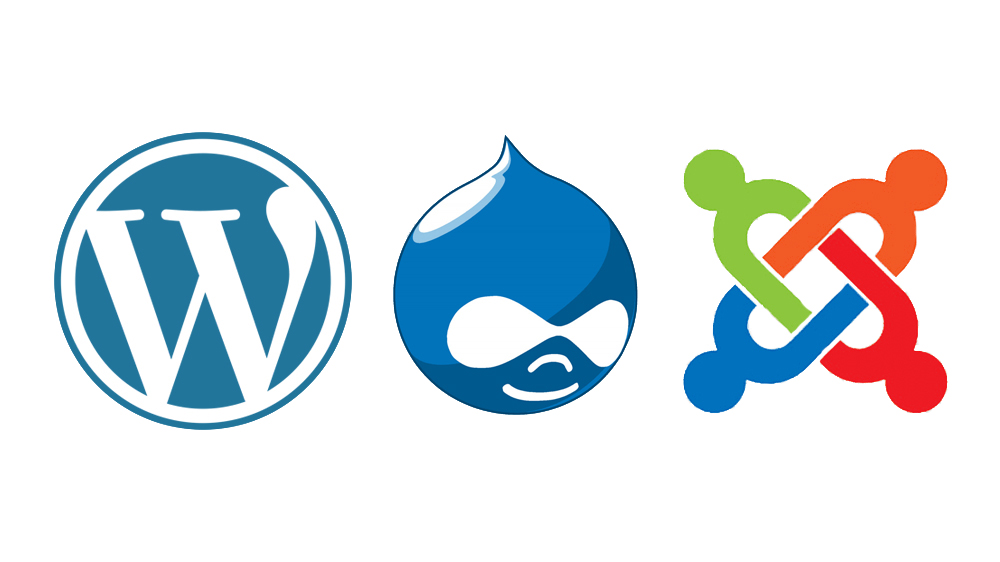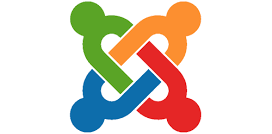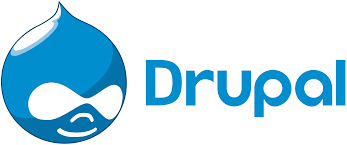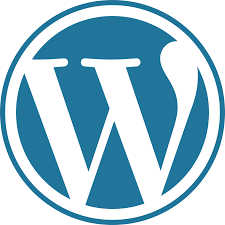CMS Comparison Joomla vs Drupal vs WordPress

It is important to have a CMS comparison Joomla vs Drupal vs WordPress study. A Content Management System (CMS) is a software tool that enables users to create, edit, publish, and manage digital content on a website without needing advanced technical expertise or coding skills.
Joomla:
Joomla is a robust, versatile, and secure CMS ideal for developing various types of websites and web applications. It excels in content management, user management, extensibility, and multilingual support.

Joomla, a highly regarded free CMS, is an excellent option for effectively creating and managing dynamic, responsive websites. Its user-friendly administration interface allows users to effortlessly navigate and utilize the extensive features and capabilities of this powerful CMS.
1: Key Features And Capabilities of Joomla:
Content Management
- Intuitive Structure: Joomla provides a user-friendly structure for articles and categories, making it simple to create, edit, and organize content without needing extensive technical knowledge.
- Support for Various Content Types: Joomla supports a wide range of content types, including standard articles, blogs, multimedia content such as images, videos, and audio files. This versatility allows for rich and diverse website content.
- Flexible Content Presentation: Content can be arranged and displayed in various ways using Joomla’s built-in modules and menus. This can give you control over how information is presented to your audience.
User Management
- Built-in Registration System: Joomla includes a robust registration system that allows site administrators to create multiple user groups with different access levels and permissions.
- Support for Authentication Protocols: Joomla supports multiple authentication protocols, including LDAP, OpenID, and even two-factor authentication, facilitating easy and secure user registration and login processes.
- Granular Access Control: The platform offers fine-grained access control, enabling administrators to set detailed permissions for what different users can access, edit, publish, and administer, ensuring content security and appropriate user access.
Extensibility
- Extensive Ecosystem: Joomla has a thriving ecosystem of over 5,000 third-party extensions and templates. These extensions range from e-commerce solutions and social media integrations to advanced security features.
- Adding Functionality: By using extensions, you can enhance your website with additional functionalities such as shopping carts, social sharing buttons, SEO tools, and more, without needing to write custom code.
- Customizable Templates: Joomla offers a wide variety of templates that we can easily set up to change the look and feel of your website, allowing for a unique and personal design.
2: key features and capabilities of Joomla:
Search Engine Optimization
- SEO-Friendly URLs: Joomla automatically generates search engine-friendly URLs using Apache’s mod_rewrite, improving your site’s visibility on search engines.
- Custom Meta Data: Each page can have custom titles, meta descriptions, and keywords, which are critical for improving search engine rankings and ensuring your content is easily discoverable.
Multilingual Support
- Multiple Language Websites: Joomla natively supports the creation of websites in multiple languages, allowing you to cater to a global audience without the need for third-party plugins.
- Language Packs: Joomla offers language packs that can translate both the admin interface and the website content, making it easier to manage and present content in various languages.
Security
- Dedicated Security Team: Joomla has a dedicated security team that monitors the platform for vulnerabilities and regularly releases updates to address any security issues.
- Robust Code Base: The platform is built on a solid code base that incorporates industry-standard security practices. This will ensure that your website is safee against common threats.
- Advanced Access Control: With features like two-step verification and detailed access control, Joomla offers enhanced security measures to protect both your site and its users.
These features make Joomla a comprehensive and versatile CMS, suitable for a wide range of website projects from simple blogs to complex corporate portals.
Other features of Joomla:
Joomla incorporates features such as page caching, RSS feeds, blogging capabilities, search functionality, and media management tools. It operates on a Model-View-Controller architecture and utilizes a MySQL database. Additionally, its admin interface is mobile-responsive and can be tailored with various modules.
Advantages:
- Exceptionally adaptable and customizable
- Native support for multilingual content
- Strong and reliable security features
- Extensive community backing and support
- Comprehensive array of advanced features and functionalities
Disadvantages:
- Significant learning curve for users
- Demands technical proficiency for effective utilization
- Management can be challenging due to complexity
- Performance may lag on large or high-traffic websites
- Additional expenses for hosting, themes, plugins, and templates are required.
Drupal: CMS Comparison Joomla vs Drupal vs WordPress
Drupal is renowned worldwide as a robust and versatile open-source Content Management System (CMS), praised for its vibrant community support and widespread acceptance among various users and organizations. Serving as a comprehensive CMS solution, Drupal stands out for its intuitive interface that simplifies content creation and publication.

It accommodates diverse content types, ranging from text to multimedia, and provides highly customizable forms, enabling users to tailor their content with precision. Moreover, Drupal excels in efficiently managing and presenting content dynamically, ensuring a seamless user experience.
Key Features of Drupal:
- Precise User Management: Drupal empowers administrators with granular control over user permissions and role definitions, allowing them to finely tune access levels and user capabilities.
- Diverse Content Types: With Drupal, users enjoy unparalleled flexibility in managing and displaying various content formats, including blogs, articles, newsletters, and more, catering to a wide range of content needs.
- Customizable Taxonomy: Drupal’s taxonomy module facilitates extensive customization of content categorization, enabling users to organize and classify content according to specific requirements and preferences.
- Adaptive Display: Leveraging responsive design technology, Drupal ensures that content seamlessly adapts to different devices and screen sizes, delivering an optimized user experience across mobile and desktop platforms.
- Advanced SEO Capabilities: Drupal boasts advanced SEO features, including user-friendly URLs, customizable page metadata, and XML sitemap generation. These features enhance the visibility of Drupal-powered websites on search engines, contributing to improved rankings and discoverability.
Advantages:
- Highly adaptable
- Scalable
- Provides strong security measures
- Boasts a sizable and engaged user community
- Advanced features and functionalities
Disadvantages:
- Steep learning curve
- Demands higher technical proficiency
- Additional expenses for hosting, themes, and plugins
- Potential for sluggish performance and resource consumption
- Limited availability of user support
WordPress: CMS Comparison Joomla vs Drupal vs WordPress
WordPress is widely acknowledged as a prominent free open-source Content Management System (CMS) set up using PHP and MySQL.

It stands out as a versatile platform, facilitating the creation and management of websites with ease and efficiency. Whether utilized as part of a hosting service like WordPress.com or on a standalone server, WordPress offers flexibility and scalability in its deployment options.
Key Features of WordPress:
- Multiple Page Styles: WordPress empowers users with the ability to dynamically create and customize pages to align with their specific content needs. This flexibility extends to the layout and design of pages, enabling users to tailor their website’s appearance to their preferences and requirements.
- Widgets: One of the hallmark features of WordPress is its extensive library of widgets, which enable users to enhance their website’s functionality effortlessly. Whether it’s incorporating social sharing buttons, displaying recent posts, or adding a search bar, widgets simplify the process of integrating interactive elements into the website.
- Theme Customization: WordPress provides users with a rich array of themes and customization options to personalize their website’s appearance. From adjusting background colors and images to modifying fonts and layouts, WordPress offers a user-friendly interface that allows users to tailor their website’s design without the need for extensive coding knowledge.
This ensures that each website can achieve a unique and visually appealing look that reflects the user’s brand identity or aesthetic preferences.
WordPress’s combination of user-friendly features, extensive customization options, and robust community support make it a popular choice for individuals and businesses alike looking to establish a dynamic and engaging online presence.
Its intuitive interface and extensive plugin ecosystem further contribute to its reputation as a versatile and powerful CMS for website creation and management.
Advantages:
- Easy to use
- No technical or coding knowledge required
- Provides excellent customization options
- Optimized for SEO
- Strong community support
Disadvantages:
- Prone to security vulnerabilities
- Challenging to manage and maintain for large websites
- Additional expenses related to hosting, themes, and plugins
- Users may encounter compatibility issues with plugins and updates
- Depending on hosting and configuration, WordPress may experience performance issues or require significant resources.
cms comparison joomla vs drupal vs wordpress:
Joomla:
- Firstly, joomla is often considered a relatively user-friendly CMS option.
- Secondly, it is popularly used for constructing a variety of blogs and websites.
- Joomla operates under the GNU General Public License.
- Its SEO capabilities are somewhat limited.
- Joomla enjoys greater usage compared to Drupal, constituting approximately 8% of websites globally.
- It utilizes SQL, MySQLi, and PostgreSQL databases.
- Finally, it is commonly employed for designing complex websites.
Drupal:
- Firstly, drupal is known as a more intricate CMS, necessitating a certain degree of coding expertise.
- For the development of large-scale web applications with robust backend security measures, Drupal is the preferred option.
- Drupal operates under the GPLv2/GPLv3 license.
- Compared to Joomla, Drupal boasts strong SEO capabilities.
- Despite its lower usage compared to Joomla, Drupal still holds a significant presence, accounting for approximately 5.5% of websites globally.
- Drupal utilizes databases such as MySQL, MariaDB, or Percona Server. It can create websites and enterprise-level applications.
WordPress:
- Firstly, wordPress is known for its simplicity and user-friendliness as a CMS.
- Secondly, it is particularly favored by bloggers, marketers, and website creators.
- WordPress, given out under the GPLv2 (or later) license by the Free Software Foundation.
- In comparison to Drupal, WordPress offers a broader range of capabilities.
- WordPress holds the largest market share, accounting for 23.8% of all websites globally.
- WordPress relies on the MySQL database.
- Finally, it is best for simpler website projects.
[Want to learn more about CMS comparison Joomla vs Drupal vs wordpress? Click here to reach us.]
Conclusion
In conclusion, the comparison of Joomla, Drupal, and WordPress reveals each platform’s unique strengths and suitability for different types of projects. WordPress stands out for its user-friendly interface, extensive plugin library, and large community support. This makes it an excellent choice for beginners and small to medium-sized websites.
On the other hand, Drupal offers unmatched flexibility, scalability, and robust security features, making it ideal for complex, enterprise-level projects that require advanced customization and integration capabilities. Meanwhile, Joomla strikes a balance between ease of use and functionality, making it a solid option for businesses and organizations looking for a versatile CMS with a range of features.
However, navigating the complexities of these platforms can be daunting, especially for users with limited technical expertise. This is where Bobcares comes in. With their comprehensive support services, users can gain access to all of the advanced features of Joomla, Drupal, and WordPress, while receiving expert assistance and guidance every step of the way.
Whether it’s troubleshooting issues, optimizing performance, or implementing custom solutions, Bobcares’ team of experienced professionals ensures that your CMS experience is seamless and hassle-free.
Ultimately, by leveraging the support services offered by Bobcares, website owners and developers can harness the full potential of Joomla, Drupal, and WordPress to create dynamic and engaging online experiences that captivate audiences and drive success.
With Bobcares by your side, you can confidently navigate the intricacies of these powerful CMS platforms and unlock endless possibilities for growth and innovation.







0 Comments